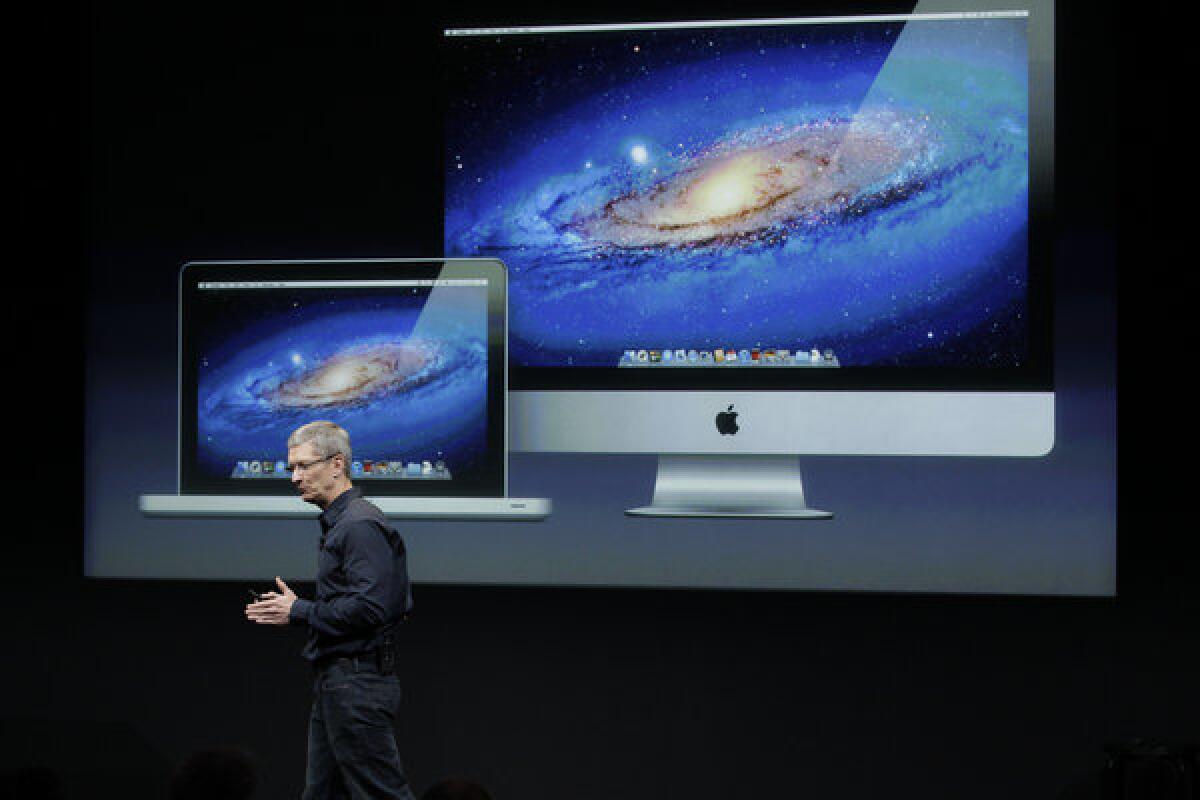Five things at stake for Apple at Senate tax hearing

- Share via
Apple hardly seems the invincible name it was just one year ago. Faced with slower growth, a badly bruised stock price and questions about its innovation leadership, the company has plenty of fights on its hand.
And now it has a new foe attempting to chip away at its reputation: Congress. On Tuesday, Chief Executive Tim Cook and two other Apple executives are scheduled to address a Senate report that claims the company managed to avoid paying billions of dollars in taxes by stashing big piles of cash in overseas subsidiaries.
PHOTOS: The top smartphones of 2013
Nobody is saying Apple did anything illegal. Indeed, many other companies, particularly tech companies, employ similar practices -- though it appears that Apple may be more aggressive than most.
Apple argues that it pays more in taxes than many other U.S. companies. Senate critics, however, point out that because it makes more money, it also may avoid more taxes.
In any case, Apple knew this report was coming, and was ready with its rebuttal.
Now, as the hearing gets underway, the big drama will be what, if any, fallout will the company face?
Here are five things at stake for Apple in Tuesday’s hearing:
1. Tim Cook’s image: The CEO faced controversy early in his tenure, when concerns about treatment of workers in factories that make Apple products reached a crescendo. Cook managed to defuse the situation (somewhat) by engaging a third party to inspect the factories, raising the bar for disclosures and insisting on raising wages. The solution hasn’t pleased all of the company’s critics, but it showed that Cook was willing to engage critics and attempt to address problems.
On Tuesday, Cook will be facing his critics in the type of un-scripted forum Apple normally likes to avoid. Indeed, its executives have rarely testified in front of Congress. Cook has cultivated a calm, unflappable image, but will aggressive Senate questioners rattle him or make him look defensive?
2. Apple’s stock: After going on a nice run after the company increased its buyback and dividends, Apple’s stock has slipped into neutral. Of course, minimizing taxes should make investors applaud. But if there’s any hint that Apple could be forced to change any of its tax practices, or worse, that the Senate seems dead set on closing some of these loopholes, investors could get anxious. Because let’s be honest, it doesn’t take much to spook Apple investors these days.
3. Tax reform efforts: Cook will reportedly propose changes to how cash is taxed when it is returned from overseas. This proposal is unlikely to go anywhere. Cisco Systems Chief Executive John Chambers has been beating the drum for a repatriation holiday for years. Many in Congress believe that the last time lawmakers granted a repatriation holiday, it was a failure. Others don’t want to appear to reward a company such as Apple for finding ways to game the system. Still, it will be interesting to see if Cook can change that dynamic -- or if he inadvertently makes Apple the poster child for corporate tax reform that leads to higher tax bills.
4. Apple’s reputation: Again, the company’s reputation has already lost some of its gloss, and even if all of its tax practices are legal, they still seem unfair to average folks who don’t have access to pricey lawyers and accountants to help the lower their tax bills. Also, Apple’s biggest problem this past year (or one of them) is the gigantic pile of cash it’s amassing. Regular folks just might wonder why the company is using every strategy in the book to clip its tax bill when it can more than afford to pay. Fair or not, the company risks looking a bit greedy to folks who don’t grasp all the nuances of tax law.
5. Apple in Europe: That sense of tax injustice has been much stronger over in Europe, in places such as Ireland, Britain and France, where budgets are stretched and services are being cut back. While Apple’s tax bills were somewhat reduced in the U.S., most of the taxes it avoided paying were in places such as Ireland, where several of the subsidiaries in question are located. The last thing the company needs over there is to be the target of a populist revolt.
ALSO:
Apple skirts U.S. taxes, panel finds
Yahoo’s Flickr to offer massive 1 terabyte of storage for free
Tumblr users take to blogs to express fear over ‘Yahoo takeover’
More to Read
Inside the business of entertainment
The Wide Shot brings you news, analysis and insights on everything from streaming wars to production — and what it all means for the future.
You may occasionally receive promotional content from the Los Angeles Times.











